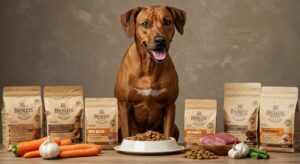Rhodesian Ridgebacks are strong, athletic, and loyal companions. Known for their endurance and muscular build, these dogs require a balanced diet to support their active lifestyle and maintain optimal health. Choosing the best dog food for Rhodesian Ridgebacks ensures your pup lives a long, energetic life.
In this guide, we’ll explore the nutritional needs of Ridgebacks, factors to consider when selecting their food, and the top-rated brands that meet their specific dietary requirements.
Understanding the Nutritional Needs of Rhodesian Ridgebacks

Rhodesian Ridgebacks are a large breed, typically weighing between 70 to 85 pounds. Because of their size and energy levels, they need high-quality protein, healthy fats, complex carbohydrates, and essential vitamins and minerals.
Key nutritional considerations:
- Protein: Supports muscle maintenance and growth.
- Fat: Fuels energy and promotes a healthy coat.
- Omega fatty acids: Important for joint health and inflammation control.
- Glucosamine and chondroitin: Support hip and joint function.
- Limited fillers: Avoid foods with excessive corn, wheat, or soy.
Factors to Consider When Choosing Dog Food for Ridgebacks
- Life Stage: Puppies, adults, and seniors have different nutritional requirements.
- Activity Level: Active Ridgebacks need more calories and protein than sedentary ones.
- Food Sensitivities: Some dogs may have allergies or intolerances to ingredients like chicken, grains, or artificial additives.
- Kibble Size and Texture: Larger kibble helps prevent gulping and promotes dental health.
Top 5 Best Dog Foods for Rhodesian Ridgebacks
Here are some of the best vet-recommended and owner-approved dog foods that cater specifically to the needs of Rhodesian Ridgebacks.
1. Orijen Original Dry Dog Food
Why it’s great: Orijen is packed with premium animal proteins like chicken, turkey, and fish. With 85% animal ingredients, it mimics the ancestral diet of dogs.
Key features:
- Grain-free formula
- High in protein (38%)
- Whole-prey ingredients including organs and bones
- Great for active and athletic Ridgebacks
2. Taste of the Wild High Prairie Canine Recipe
Why it’s great: Made with real roasted bison and venison, this grain-free option offers novel proteins that are easier to digest for sensitive stomachs.
Key features:
- Rich in antioxidants and probiotics
- Omega-3 and 6 fatty acids for skin and coat health
- No corn, wheat, or artificial flavors
3. Blue Buffalo Wilderness Large Breed Chicken Recipe
Why it’s great: Specially formulated for large breeds, this food contains the right balance of protein and joint-supporting nutrients.
Key features:
- Deboned chicken as the first ingredient
- Added glucosamine and chondroitin
- LifeSource Bits with vitamins and antioxidants
- No poultry by-products
4. Hill’s Science Diet Large Breed Adult
Why it’s great: Recommended by veterinarians, this formula focuses on overall wellness, joint health, and easy digestion.
Key features:
- Made with high-quality chicken and barley
- Clinically proven antioxidants
- Natural ingredients with no artificial preservatives
- Ideal for dogs over 55 lbs
5. Wellness CORE Grain-Free Large Breed
Why it’s great: Wellness CORE offers a high-protein, grain-free option designed for large breeds like Ridgebacks.
Key features:
- Deboned chicken and turkey
- Glucosamine, chondroitin, and taurine
- Supports lean body mass and heart health
- No wheat, corn, soy, or meat by-products
How Much Should You Feed a Rhodesian Ridgeback?
Feeding amounts depend on your dog’s age, weight, activity level, and the calorie content of the food. On average, adult Ridgebacks need around 1,200 to 1,800 calories per day.
General feeding guidelines:
- Puppies (8-12 weeks): 3-4 meals per day
- Adults (1-7 years): 2 meals per day
- Seniors (8+ years): 2 smaller meals with fewer calories
Always follow the feeding instructions on the dog food package and consult with your vet for a personalized feeding plan.
Tips for Transitioning to a New Dog Food
When switching to a new dog food, do it gradually over 7-10 days to avoid digestive upset.
Transition schedule:
- Day 1-3: 75% old food, 25% new food
- Day 4-6: 50% old food, 50% new food
- Day 7-9: 25% old food, 75% new food
- Day 10: 100% new food
Watch for signs of intolerance such as diarrhea, vomiting, itching, or lethargy. If any issues persist, consult your veterinarian.
Common Health Concerns in Rhodesian Ridgebacks
Feeding your Ridgeback a balanced diet can help prevent or manage common breed-specific health concerns, including:
- Hip dysplasia: Support joints with glucosamine-rich foods.
- Dermatitis: Choose foods with omega-3s to reduce inflammation.
- Hypothyroidism: Provide iodine-rich ingredients and avoid soy.
- Obesity: Avoid overfeeding and monitor weight regularly.
A high-quality dog food designed for large, active breeds can go a long way in maintaining your dog’s health and energy levels.
Final Thoughts: Choosing the Best Dog Food for Your Ridgeback
Your Rhodesian Ridgeback deserves the very best. Whether you prefer a grain-free, high-protein formula or a vet-recommended kibble for joint health, choose a dog food that matches your pup’s life stage, activity level, and any dietary sensitivities.
Investing in premium nutrition today ensures your Ridgeback stays strong, happy, and by your side for many years to come.
FAQs
What is the best dog food for a Rhodesian Ridgeback with allergies?
Answer: Choose a limited-ingredient diet or a novel protein formula like Taste of the Wild or Zignature, which are ideal for dogs with food sensitivities.
Should Rhodesian Ridgebacks eat grain-free food?
Answer: Not necessarily. Unless your dog has a grain allergy, whole grains like brown rice or oatmeal can provide beneficial nutrients and energy.
Can I feed my Rhodesian Ridgeback raw food?
Answer: Yes, but consult your vet first. Raw feeding requires careful planning to ensure nutritional balance and food safety.